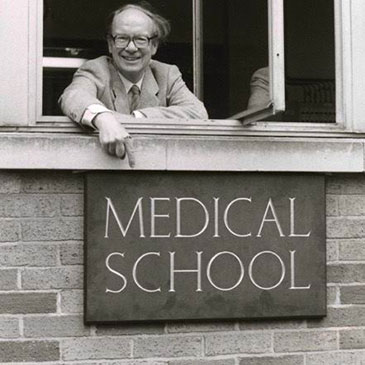Declan Anderson was a dentist and physiologist; but foremost, a scientist. He was educated at Christ’s Hospital School and Guy’s Hospital. After graduating in Dentistry in 1942, he went on to obtain a BSc in Physiology in 1946, and a PhD in 1955. During these latter studies he held clinical posts and a lectureship in Physiology at Guy’s.
He published widely and his first paper, on the temperature changes produced by drilling in teeth, was on research done as an undergraduate. He was the first person to record masticatory forces in humans during natural chewing. He did this with a miniature transducer that he skilfully engineered and incorporated into a gold inlay in a human molar. This was featured in a live broadcast from his laboratory in one of the early programmes in the BBC’s Tomorrow’s World series. But he is best known for his work on the sensory mechanisms responsible for pain from dentine, a field to which he and his students have contributed extensively.
He also made important contributions to dental education. He believed strongly that staff involved in teaching or research in dental sciences should not be based in small, isolated departments in dental schools, but in larger departments in medical schools or the science faculties of universities. This emphasis on the integration of dental and medical sciences was reflected in his Textbook of Physiology for Dental Students, published in 1952. He found support for this view in the 1960s from Arthur Darling, who was Dean of the Faculty of Medicine in Bristol at the time, and also a dentist. As a result, Bristol created lectureship posts for dentists in the departments of Anatomy, Biochemistry, Physiology and Pharmacology in the Medical School, and a chair in Oral Biology for someone to oversee these posts and integrate basic science and clinical teaching in the Dental School. Declan was appointed to that chair in 1966, and remained in the post until he retired in 1985.
The group that he formed in Bristol was very successful, and representatives from dental schools around the world came to see how the system worked. Dental students were encouraged to intercalate a BSc in a basic science during their course and continue to a PhD; and many did so. As a result, a large number of senior posts in dental research in this country and abroad have been filled by Declan’s students. At the last count, 12 of his former PhD students are professors, among them past or present heads of department, deans, and the editor of an international research journal.
Declan was great fun: he had a wonderful sense of humour and sharp wit. He always included amusing anecdotes relevant to the subject under discussion in his lectures, and they were very popular with students. He was very fond of practical jokes, which were typically carried out deviously and with great attention to detail. Sometimes the targets of his jokes sought their revenge with a joke on him in the same style. On one occasion an amplifier was delivered to his laboratory from Tektronix in the USA. It was packed in popcorn for protection, much as a piece of fragile equipment would be packed in polystyrene beads today. After unpacking the amplifier, Declan saved the box full of popcorn, put it under his desk, and would occasionally take a handful and eat it. An American student who was working in the lab at the time and who had experienced Declan’s antics, was from Portland in Oregon where Tektronix have their headquarters, and knew a secretary who worked there. He arranged for a letter to be sent to Declan with a copy of a notice that, the letter explained, had been accidentally omitted from the parcel containing the amplifier. The notice warned that the popcorn had been treated with an anti-inflammatory agent that was highly toxic. When Declan opened the letter he was understandably very worried for a few moments, until the source of the letter was revealed.
Declan was an accomplished silversmith, and was commissioned to make many pieces as gifts or presentations for individuals and organisations; all with his DJA hallmark, of which he was very proud. He wrote two books on silversmithing. Further details of his work as a silversmith can be found in a Stanford University news item and (with photographs) on the Bristol Dental Alumni Association web pages.
His wife, Joy, predeceased him, as did two of their seven children.
